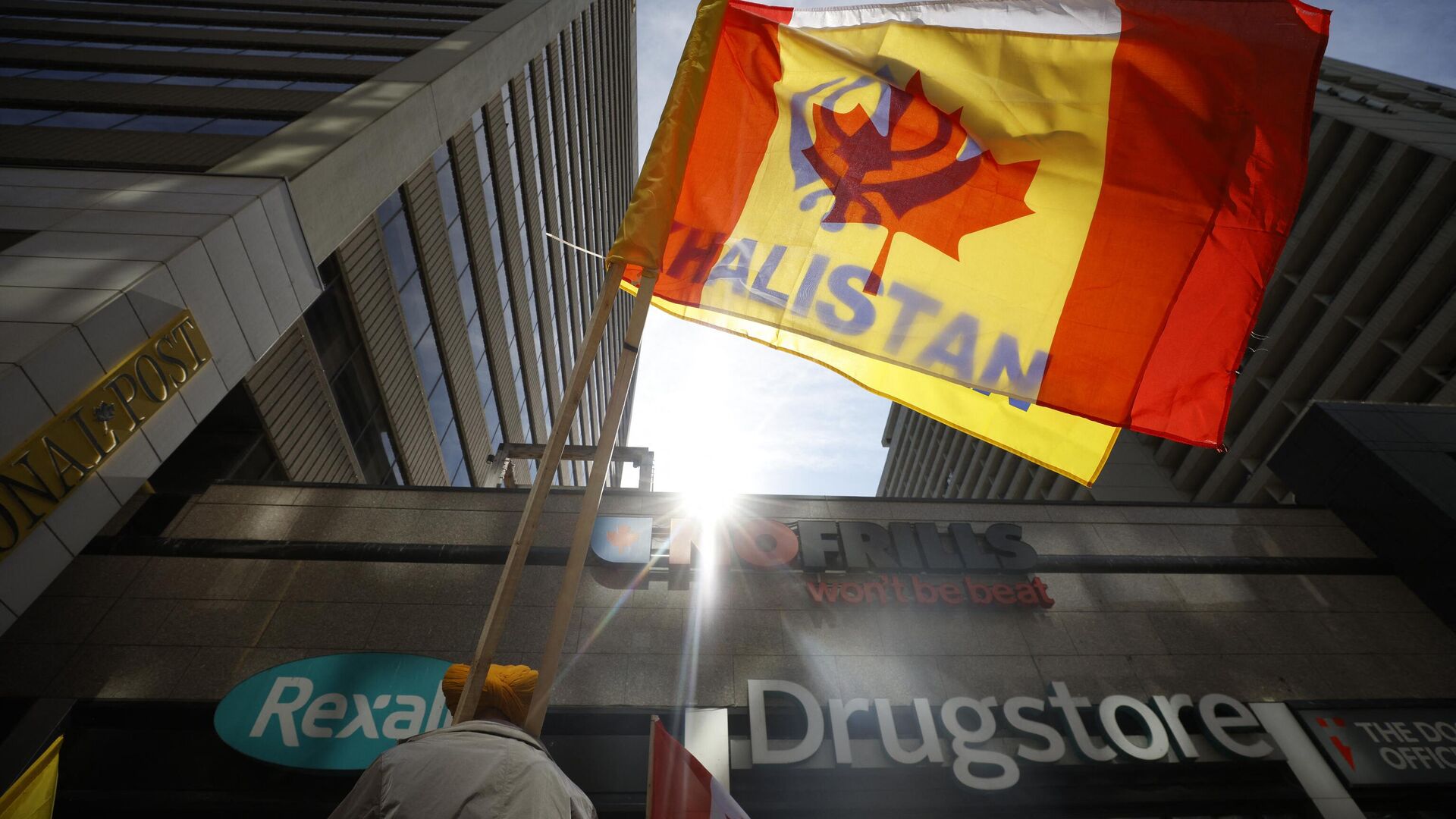https://sputniknews.in/20240713/canadas-laws-permit-advocacy-for-khalistan-independence-in-india-7840179.html
Canada's Laws Permit Advocacy for Khalistan Independence in India
Canada's Laws Permit Advocacy for Khalistan Independence in India
Sputnik India
Canada's legal framework allows its citizens to advocate for the creation of a separate territory within India, whether through a referendum or financial... 13.07.2024, Sputnik India
2024-07-13T14:58+0530
2024-07-13T14:58+0530
2024-07-13T14:58+0530
justin trudeau
narendra modi
s. jaishankar
canada
india
united kingdom (uk)
air india
government of india
ministry of external affairs (mea)
ministry of defence (mod)
https://cdn1.img.sputniknews.in/img/07e8/02/08/6487277_0:161:3070:1888_1920x0_80_0_0_6d959a91e043d087616ed17a8b29b100.jpg
Canada's stance on issues related to Khalistani separatism in India has sparked controversy, with some perceiving it as openly advocating for a separate Khalistani state within India.Staton acknowledged the Sikh community's uncertainty regarding permissible political expression, affirming that holding such opinions are protected and not considered ‘extremism or terrorism’ in Canada, and similarly safeguarded by freedom of expression and speech under UK laws.Staton highlighted that as long as activities do not incite hate or support terrorism, and remain peaceful, they will continue to be ‘protected by the government’ from intervention, whether domestic or foreign.India Warns Canada of Rising Khalistani Threats & Historical Militant ActivitiesDuring a meeting at the recent G20 Summit in Delhi, PM Narendra Modi expressed India's serious concerns to Canadian PM Justin Trudeau regarding the ongoing anti-India activities of Khalistanis in Canada.Trudeau defended Khalistanis, asserting Canada's commitment to peaceful protest, despite symbols of violence being present. He acknowledged the Sikh community's diversity but did not commit to action against extremists.Talwinder Parmar later orchestrated the bombing of Air India flight Kanishka in 1985, resulting in the deaths of all 329 passengers and crew.
https://sputniknews.in/20240630/canadian-foreign-policy-is-thoroughly-compromised-by-khalistanis-ex-fm-7736592.html
canada
india
united kingdom (uk)
us
Sputnik India
feedback.hindi@sputniknews.com
+74956456601
MIA „Rossiya Segodnya“
2024
Swapna Nair
https://cdn1.img.sputniknews.in/img/07e7/09/12/4320104_0:0:681:681_100x100_80_0_0_ca8a7d4d582609272840ffdd1cde7278.jpg
Swapna Nair
https://cdn1.img.sputniknews.in/img/07e7/09/12/4320104_0:0:681:681_100x100_80_0_0_ca8a7d4d582609272840ffdd1cde7278.jpg
News
en_IN
Sputnik India
feedback.hindi@sputniknews.com
+74956456601
MIA „Rossiya Segodnya“
Sputnik India
feedback.hindi@sputniknews.com
+74956456601
MIA „Rossiya Segodnya“
Swapna Nair
https://cdn1.img.sputniknews.in/img/07e7/09/12/4320104_0:0:681:681_100x100_80_0_0_ca8a7d4d582609272840ffdd1cde7278.jpg
canada, sovereignty, extremism or terrorism”, canadian law, dan stanton, canadian director of national security at uottawa pdi, khalistani issues, canada, khalistani separatism, india, separate khalistani state, india, canadian, non-violent, sikh community, political expression, ‘extremism or terrorism’, canada, uk laws, quebec, canada, terrorism,prime minister narendra modi, india, canadian pm justin trudeau, anti-india activities, khalistanis, canada, secessionism, inciting violence against indian diplomats, damaging diplomatic premises, indian community, drug and human-trafficking networks, justin trudeau, khalistanis, khalistani terrorist talwinder parmar, pierre trudeau's government, bombing of air india flight kanishka in 1985, canadian prime minister brian mulroney
canada, sovereignty, extremism or terrorism”, canadian law, dan stanton, canadian director of national security at uottawa pdi, khalistani issues, canada, khalistani separatism, india, separate khalistani state, india, canadian, non-violent, sikh community, political expression, ‘extremism or terrorism’, canada, uk laws, quebec, canada, terrorism,prime minister narendra modi, india, canadian pm justin trudeau, anti-india activities, khalistanis, canada, secessionism, inciting violence against indian diplomats, damaging diplomatic premises, indian community, drug and human-trafficking networks, justin trudeau, khalistanis, khalistani terrorist talwinder parmar, pierre trudeau's government, bombing of air india flight kanishka in 1985, canadian prime minister brian mulroney
Canada's Laws Permit Advocacy for Khalistan Independence in India
Canada's legal framework allows its citizens to advocate for the creation of a separate territory within India, whether through a referendum or financial support, without fear of imprisonment, according to Dan Stanton, Canadian Director of National Security at uOttawa PDI.
Canada's stance on issues related to Khalistani separatism in India has sparked controversy, with some perceiving it as openly advocating for a separate Khalistani state within India.
“We [Canada] allow the Canadian’s to express their view that a part of country could separate peacefully and non-violent, whether through referendum or spending money on it and no one would go to jail”, Stanton noted.
Staton acknowledged the Sikh community's uncertainty regarding permissible political expression, affirming that holding
such opinions are protected and not considered
‘extremism or terrorism’ in Canada, and similarly safeguarded by freedom of expression and speech under UK laws.
"Advocating for the separation of a specific area in another country [India] cannot be distinguished from someone in Quebec stating that they should separate from Canada and no longer belong here, for any reasons whatsoever," he affirmed.
Staton highlighted that as long as activities do not incite hate or support terrorism, and remain peaceful, they will continue to be ‘protected by the government’ from intervention, whether domestic or foreign.
India Warns Canada of Rising Khalistani Threats & Historical Militant Activities
During a meeting at the recent G20 Summit in Delhi, PM
Narendra Modi expressed India's serious concerns to Canadian PM
Justin Trudeau regarding the ongoing anti-India
activities of Khalistanis in Canada.
Modi pointed out that Khalistanis were advocating for secessionism, inciting violence against Indian diplomats, damaging diplomatic premises, and threatening the Indian community and their places of worship, often in collusion with drug and human-trafficking networks.
Trudeau defended
Khalistanis, asserting Canada's commitment to peaceful protest, despite symbols of violence being present. He acknowledged the Sikh community's diversity but did not commit to
action against extremists. In 1982, India requested Canada to extradite Khalistani terrorist Talwinder Parmar for his alleged involvement in the killing of police officers. However, under Pierre Trudeau's government, Canada refused the extradition request, citing India's insufficient recognition of the Queen as a legal reason.
Talwinder Parmar later orchestrated the
bombing of Air India flight Kanishka in 1985, resulting in the deaths of all 329 passengers and crew.
Indian External Affairs Minister Jaishankar cautioned that the increasing Khalistani activity, associated with drug syndicates, poses a significant concern for Canada as well.



